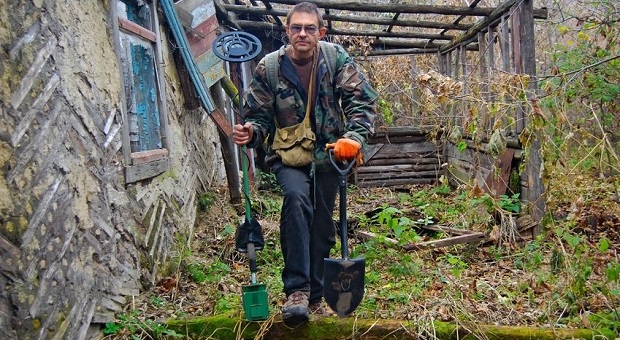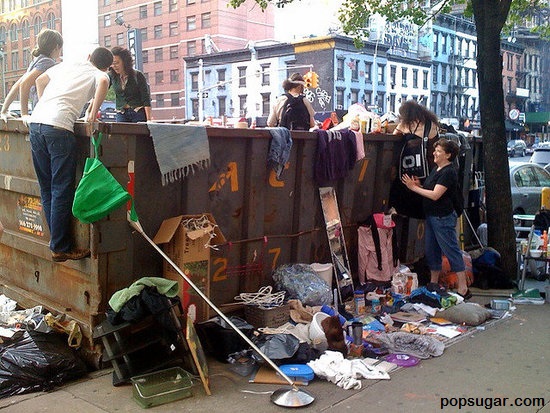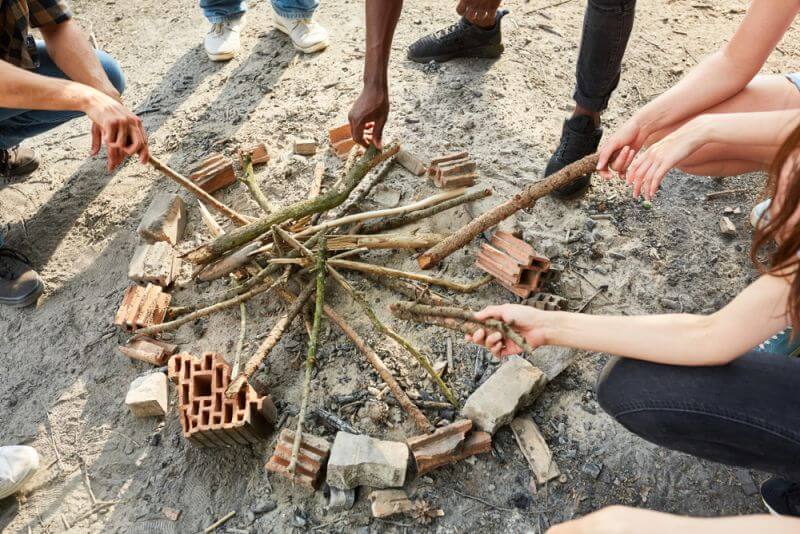Scavenging, freeganism, dumpster diving, gleaning; no matter what it’s called, it’s becoming a way of life for many people, and not just because they’re poor. The average Joe (or Jane!) throws away anything that no longer works even if it’s fixable.
Grocery stores and restaurants toss food that’s perfectly edible and the idea of such waste is appalling to some. Proponents of repurposing have elevated their hobby to an art form; they go through trash to get whatever they think is salvageable.
Is this gross or simply good, green economics?
Let’s talk about it!
Depending on what source you check, as much as 200 million tons of refuse goes into landfills each year. Considering that much of that is used clothing, electronics, books and food, it seems only logical that much of it could be salvaged or repurposed.When you consider how wasteful we are as a society, it’s a case of one man’s trash being another man’s treasure.
Most people are of the mindset that everything is disposable.
If the sweater shrinks a bit, toss it in the trash and buy another. If the garden hose gets a wee leak, toss it; Walmart sells them for under $30.
Finished painting and have 3 gallons of paint left? Pitch it because it’s taking up space. We live in a society ruled by convenience rather than frugality.
Where once we would have darned a sock with a hole in it, now we just pitch it and buy a new pack. This way of living is cultivated by laziness and the ready availability of credit lines that allow us to buy now and pay later. When you look at it like that, scavenging doesn’t seem quite so gross; as a matter of fact, the waste is what seems repulsive if you’re being logical.
Enter scavengers. These are people who see dumpsters and curb-side bags as places to search for hidden treasure. Where most people see trash, they see endless opportunity.
Look in the bag: what possible gold may be inside?
A barely used scarf? Awesome! A set of silverware missing a couple of butter knives? So what – who uses them all at once anyway? How about a pair of stinky old Nikes? No thanks. Those truly are garbage.
It’s just a matter of what you like and what you (or your family and friends) truly need or want. Really, what’s the difference between scavenging and yard-sale shopping, other than scavenging is free?
The Scavenging Stigma
Seriously, this is probably THE BIGGEST ISSUE for most people.
We’re socially programmed to believe that scavenging through garbage is dirty. Anything that you get from a dumpster has to have something wrong with it, and you’re looked at with pity or disgust because you’d actually consider going through somebody else’s trash to find something to take home.
So what? Once you get it home, who’s going to know anyway? And who really cares, after all is said and done?
The problem is that we’re a capitalistic, corporate-minded, greed-driven society that absolutely must shop for the best. The more you pay for something, the higher up on the chain you are. That’s so bass-ackwards that it’s not even funny.
Thanks, but I’ll take the free sweater and save my money for something else.
The Benefits of Scavenging
Speaking of capitalism, I actually know people who have turned scavenging into extremely profitable businesses.
They know when garbage goes out in each neighborhood and they drive around searching for valuables. They pay attention to department store dumpsters and even cruise through the back of the grocery stores to grab some day-old donuts for breakfast. Then they take their treasures home, clean them up and sell what they don’t need. It’s almost pure profit.
They don’t steal, they don’t scam people and they’re doing the environment a huge favor. They also make a tidy profit both in sales and savings by doing it.
They are the ultimate hunter-gathers and they’re proud of it.
Where and How to Scavenge
Really, you can do it anywhere. Do you see something discarded alongside the street? Stop and check it out. This is a great place to get furniture, clothing, electronics and appliances, especially if you’re handy. If you’re creative, you probably see a whole host of possibilities just by driving to work.
In most places, once trash hits the curb, it’s public property and therefore legally pickable but be considerate and don’t make a mess.
Department stores throw away all sorts of stuff on a daily basis but you have to be careful. If the dumpster is locked in a fence or has a “no trespassing” sign, you can be arrested for dumpster diving there. Often though, if you ask a manager, you can get permission. It just depends on the manager and the store.
Grocery stores aren’t allowed to keep food past the expiration date and it all has to go in the trash. Sometimes vendors take it back for a refund but sometimes it goes in the dumpster. What’s one more day on a loaf of bread that’s already been on the shelf for a week?
So what if the box is beat up on the pasta? Produce is often tossed way before it’s actually bad, too. Canned food is actually good for up to 10 years, though most companies don’t date them for more than a couple of years.
Another reason that some people scavenge is to get the metal from discarded objects.
Copper and aluminum bring a nice price at the salvage yard and even steel can be worth something. Computers, wiring, cans and motors are all good sources of recyclable metals. It may require a bit of disassembly, but the effort can be worth it when there’s no financial investment.
Basically, there’s nothing wrong with a huge percentage of stuff that gets thrown away on a daily basis. Sometimes a minor repair can revive a product so that you get years of use from it. It’s all just a matter of perspective.
Video first seen on Courtney Brad
Know When to Walk Away
The big thing to remember is that you don’t want to get carried away with scavenging. You’re doing it to save money and to provide for yourself and your family. If you don’t need an item or know somebody that needs it, don’t bother picking it up. Leave it for somebody else that may have a use for it.
Scavenging is a lot like couponing or going to yard sales; it’s easy to get carried away by the idea that the item is free. However, if it’s not useful to you, then it’s just junk at your house instead of at somebody else’s.
Do you have any cool tips for scavenging, or an opinion on the topic? If so, please share it with us in the comments section below!
This article has been written by Theresa Crouse for Survivopedia.










Wayne Yeauger | March 5, 2015
|
Hello home girl. This article was in formative and thank you for it.
Stephane D Farley | March 5, 2015
|
We all need this skill teach our kids even and pray over it.
Ronald F. Bradford | March 5, 2015
|
I guess I waste more than I make with “scavenging” when I drive around the neighborhoods in my pickup and pick up all scrap iron or ceiling fan blades or microwaves, washers, dryers, dish washers, fridges, etc. Taking each one apart separating motors, iron, aluminum, wiring and some stiff foam insulation. Plastic is the only thing I don’t take. I take some types of wood, blocks, boards and some tree limbs that I might use for the fireplace. In doing so, a lot of it is taken for recycling at the local business. Electrical wire is stored and hand-stripped and stocked up until I have several pounds of it…both #1 and #2 copper. Aluminum cans are a given. About 15 cans make a pound and the going rate is about 60-65 cents a pount.
So…my answer is definitly yes! I am into scavenging…big time. I’m retired so I have the time to take to take all the appliances apart to make a little more money selling the parts.
Donna | March 5, 2015
|
Re: shelf life of cans. A friend of mine who has worked as a Manager in a large canning factory for many years, warned me about the plastic liners they manufacture in cans to protect the food from the can metal. The liners only last a limited amount of time before they start to deteriorate, exposing the food to the metal. The food can still taste edible, but can contain heavy metals contamination from the can. Acid based foods being the most reactive. He also warned me to never buy a dented can as it cannot be assured the plastic lining has not been compromised. With his many years of experience, I tend to trust his warning carries validity, but I also contacted a large company who cans their own food storage products regarding this issue, and was informed that canned products are not intended to sit on shelves & in storage for many years, but intended to be used & “rotated” with fresh cans. I would really welcome any valid expert advise on the subject for my food storage supply.
laura m. | March 6, 2015
|
Donna: good info. mainly to avoid dented cans and try to get tomato sauce (I buy pizza sauce in jars which is same as tomato puree) in glass. I normally don’t buy canned stuff except salmon and beans.
tim | March 6, 2015
|
Theresa, thank you for the latest in a string of really truly useful articles. I look forward to read more of your writings.
Anthony McDonald | March 6, 2015
|
Hello to you all! I loved the article on scavaging. Im a big time prepper and I wanted to pass on to you my idea of “The Hobo Rope”. I collect hundreds of those annoying plastic bags you get from the grocery store, tie the ends together into three long seperate strands, braid then together into a very tough, durable “Hobo Rope”. I wrap the finished product with filament tape, and now have fifty feet of strong rope that cost virtually nothing, plus I saved the economy the headache of discarded plastic bags!!
Rose | March 11, 2015
|
This hobo rope sounds interesting but can you make it clearer about how you tie the ends together? I understand why you are tying them together in three separate strands but I’m just confused on how you actually tie the plastic bags together. Thanks!
Great Grey | March 30, 2015
|
For several years now they make some plastic bags that disintegrate in 6 months to a year no mater how you store them and they make a big mess. Both in food bags and carry sacks so while you make something with them when you go to use it is nothing but little pieces that cling to everything.
PC | March 7, 2015
|
What about spreading bacteria? Aren’t dumpsters major sources of contamination? Also, wouldn’t this spread disease?
It seems that society needs a better solution besides tossing unwanted goods into dumpsters. If people had easy and better alternatives, they might happily go along with a better plan.
Pingback:Buying Cheap To Build Your Stockpiledisasterdefense.us | disasterdefense.us | May 14, 2015
|
Ian | February 7, 2016
|
Worried about the stigma ??
Go at night or, if you’re an early riser and up waayyyyy before most people go in the early morning when it’s already light outside and most people are still sleeping.
Also remember that in the suburbs, most people are at work during the day, so there is nobody to see you, except others doing the same as you.
Pingback:15 Ways A Prepper Can Use Magnets | Prepper's Survival Homestead | May 26, 2016
|
Pingback:15 Ways A Prepper Can Use Magnets - Backdoor Prepper | May 26, 2016
|
Pingback:15 Ways A Prepper Can Use Magnets | Survivopedia | May 27, 2016
|
Pingback:17 Ways A Preper Can Reuse Motor Oil | Survivopedia | January 2, 2017
|